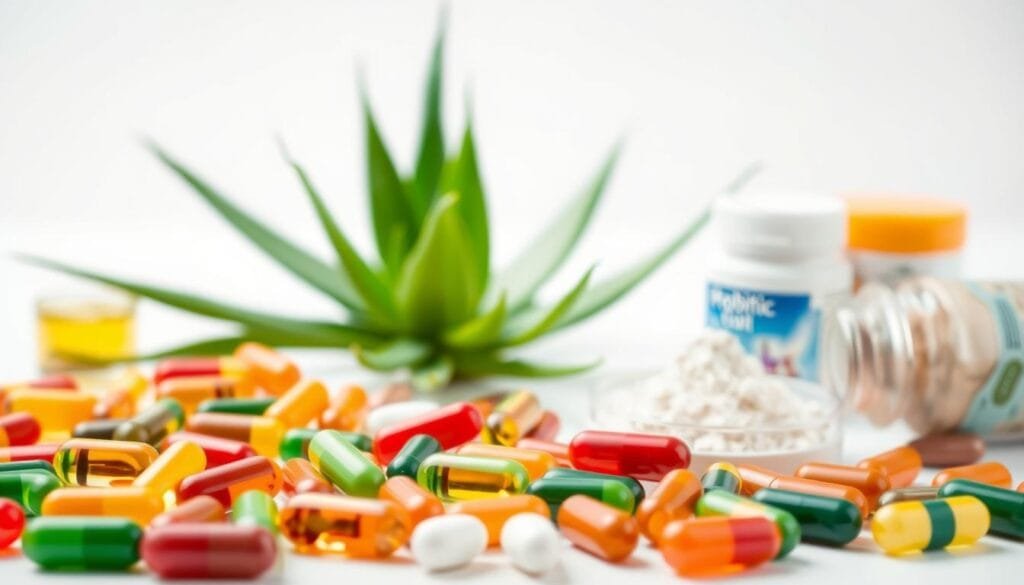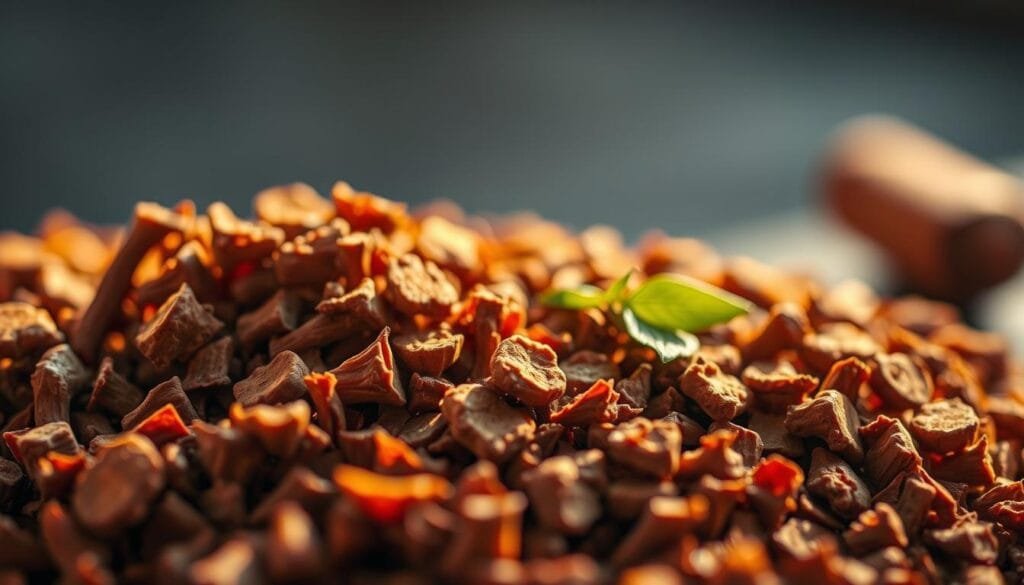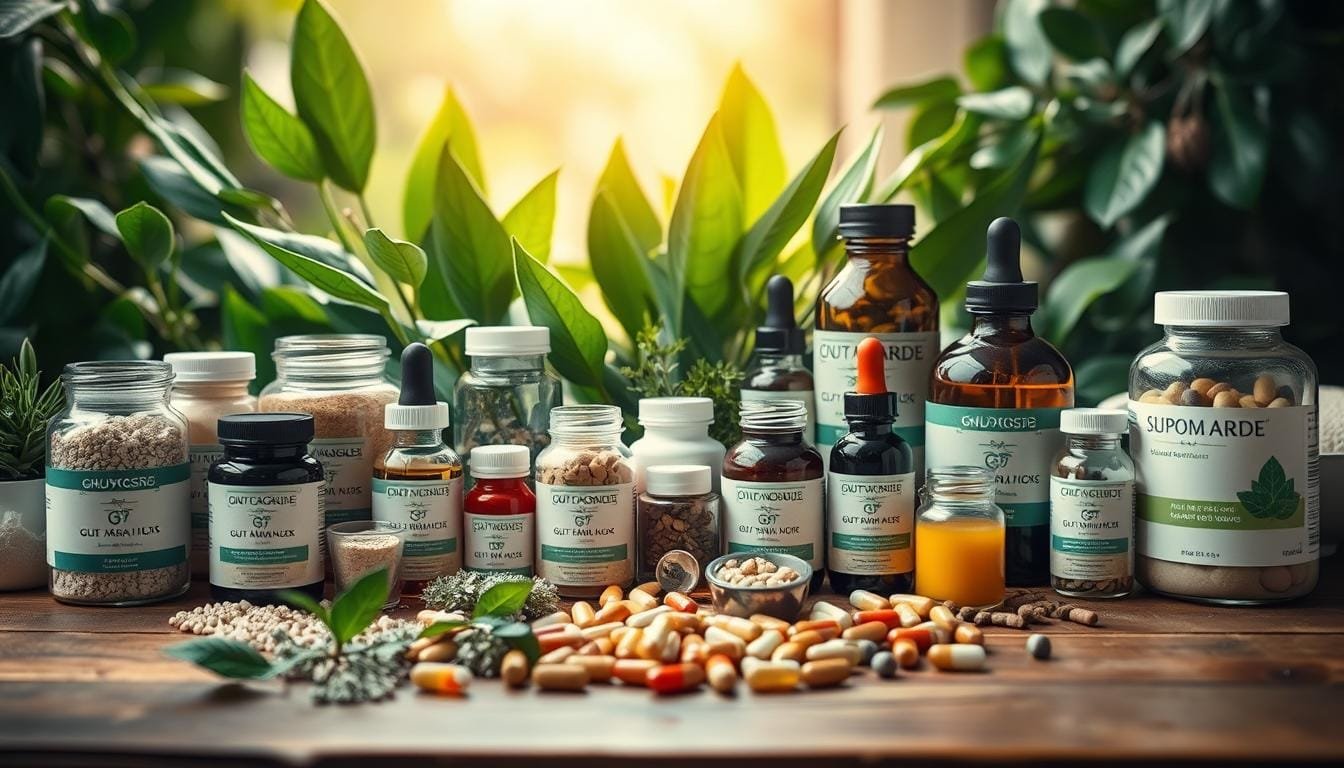Currently Empty: RM0.00
Ever feel bloated, tired, or sensitive to certain foods? These could be signs of a compromised digestive system. Many people overlook the connection between gut health and overall well-being, but research shows it plays a crucial role in immunity, energy, and even mood.
Wellness Concept offers trusted guidance for those seeking natural ways to support digestive health. Their experts provide personalized advice on effective solutions, including clinically studied ingredients like zinc, L-glutamine, and probiotics. Whether dealing with leaky gut syndrome or general discomfort, they help clients find balance.
For quick assistance, reach out via WhatsApp: +60123822655. Available seven days a week, their team ensures accessible support when needed most.
Key Takeaways
- Gut health impacts overall wellness, including immunity and energy levels.
- Common symptoms like bloating may signal deeper digestive issues.
- Wellness Concept provides expert-backed solutions in Malaysia.
- Key ingredients like probiotics support a healthy digestive system.
- Extended business hours ensure timely support via WhatsApp.
Understanding Gut Health and Why It Matters
A thriving microbiome supports more than just efficient digestion. Often called the second brain, this complex system communicates with the entire body. It regulates immunity, mood, and even skin clarity.
The Role of the Gut in Overall Health
Nearly 70% of immune cells reside in the digestive tract. This network defends against pathogens while absorbing nutrients. When balanced, it helps maintain energy and hormonal harmony.
Research shows disruptions here may trigger autoimmune responses. For example, the zonulin protein can loosen intestinal tight junctions. This may lead to systemic inflammation.
Common Signs of Gut Imbalance
Subtle symptoms often hint at deeper issues. Watch for:
- Chronic discomfort: Bloating, cramps, or irregular bowel movements.
- Unexplained fatigue: Poor nutrient absorption drains vitality.
- Skin flare-ups: Conditions like eczema may reflect internal strife.
According to the NIDDK, 60–70 million Americans face digestive diseases yearly. Addressing these signs early supports long-term wellness.
What Supplements Repair the Gut? Top Picks for Digestive Wellness
Science-backed ingredients can restore digestive balance. Two standouts—zinc and L-glutamine—play critical roles in maintaining a resilient gut lining. Research highlights their unique benefits for mucosal repair and cellular fuel.
Zinc: Strengthening the Gut Barrier
A 2001 study found zinc reinforces tight junctions in Crohn’s patients. This mineral supports mucosal repair and reduces permeability. Daily intake of 15–30mg is ideal for digestive health.
Foods like red meat and beans provide zinc, but absorption varies. Supplements offer a reliable alternative, especially for those with dietary restrictions. Wellness Concept’s zinc formulas ensure optimal bioavailability.
L-Glutamine: Fuel for Intestinal Cells
This amino acid is the primary energy source for *enterocytes*—cells lining the intestines. A 2015 study showed it reduces permeability post-exercise. Dosages range from 15–45g daily, depending on needs.
While poultry and eggs contain L-glutamine, high doses often require supplementation. Wellness Concept’s curated glutamine products deliver pure, effective support for gut resilience.
| Nutrient | Role in Gut Health | Food Sources | Supplement Dosage |
|---|---|---|---|
| Zinc | Repairs mucosal lining, tightens junctions | Red meat, legumes | 15–30mg/day |
| L-Glutamine | Fuels intestinal cells, reduces permeability | Poultry, eggs | 15–45g/day |
For personalized guidance, Wellness Concept’s experts tailor recommendations based on lifestyle and health goals. Their clinically vetted options simplify the path to digestive wellness.
Probiotics: The Foundation of a Healthy Microbiome
Balancing beneficial bacteria is key to digestive wellness. These live microorganisms, known as probiotics, help maintain harmony in the digestive tract. They crowd out harmful pathogens while strengthening the body’s natural defenses.

How Probiotics Support Gut Barrier Function
A 2012 trial found multi-strain probiotics reduce zonulin levels by 14%, enhancing intestinal tightness. They also boost mucus production, creating a protective layer against irritants. This dual action shields the lining from damage and inflammation.
Fermented foods like kombucha and sauerkraut naturally contain these microbes. For targeted support, high-quality supplements ensure consistent strain potency. Wellness Concept’s best probiotics for anti-aging blends are tailored for Malaysian dietary preferences.
Best Probiotic Strains for Gut Repair
Not all strains offer equal benefits. Research highlights two standouts:
- Lactobacillus rhamnosus GG: Reduces IBS symptoms and supports immunity.
- Saccharomyces boulardii: A yeast strain that combats diarrhea and infections.
| Strain | Primary Benefit | Recommended For |
|---|---|---|
| Lactobacillus acidophilus | Balances pH levels | General digestive health |
| Bifidobacterium lactis | Reduces bloating | IBS sufferers |
| Streptococcus thermophilus | Enhances lactose digestion | Dairy-sensitive individuals |
For personalized strain recommendations, Wellness Concept’s experts analyze lifestyle and health history. Their blends combine science with local dietary insights for optimal results.
Collagen Peptides: Strengthening the Gut Lining
Modern research highlights collagen as a key player in maintaining intestinal strength. This protein forms the scaffolding of the digestive tract, preventing breakdowns that lead to discomfort. A 2021 study confirmed its role in preserving tight junctions, crucial for a healthy barrier.
The Science Behind Collagen and Gut Health
Collagen peptides provide amino acids like glycine and proline, which rebuild intestinal tissue. Gelatin tannate, a collagen derivative, was shown in 2012 to reduce inflammation by 30%. These compounds act like mortar, sealing gaps in the gut lining.
Two primary sources dominate the market:
- Bovine collagen: Rich in types I and III, ideal for structural support.
- Marine collagen: Smaller peptides for faster absorption, sourced from fish scales.
How to Incorporate Collagen into Your Diet
Adding collagen powder to morning smoothies or bone broth ensures easy digestion. Just one scoop (10g) daily can enhance mucosal integrity. For those with dietary restrictions, unflavored varieties blend seamlessly into hot beverages.
Beyond gut repair, users often notice glowing skin and reduced joint stiffness. Wellness Concept’s hydrolyzed collagen options cater to Malaysian preferences, balancing efficacy with local tastes.
Fiber and Butyrate: Nourishing Your Gut Flora
Fueling digestive wellness starts with the right nutrients. Fiber and butyrate work synergistically to strengthen the intestinal barrier and reduce discomfort. These components act as fuel for beneficial bacteria, promoting a resilient gut microbiome.
The Link Between Fiber and Gut Healing
A 2015 study revealed that butyrate, produced when fiber ferments, tightens intestinal junctions. This reduces permeability and shields against irritants. Adults should aim for 25–38g of fiber daily for optimal benefits.
Top food sources include:
- Oats: Rich in beta-glucans, which soothe the digestive tract.
- Bananas: Packed with prebiotics to feed good bacteria.
- Leafy greens: High in insoluble fiber for regularity.
“Psyllium husk, a soluble fiber, relieved constipation in 89% of participants in a 2021 trial.”
Butyrate’s Role in Reducing Inflammation
This short-chain fatty acid lowers inflammatory cytokines, cutting colitis risk by up to 40%. It also energizes colon cells, enhancing mucosal repair. For busy lifestyles, Wellness Concept’s prebiotic blends offer a convenient way to boost butyrate production.
| Fiber Type | Primary Benefit | Best For |
|---|---|---|
| Soluble (e.g., psyllium) | Softens stool, feeds bacteria | Constipation relief |
| Insoluble (e.g., wheat bran) | Adds bulk | Regularity |
Note: Excessive insoluble fiber may worsen constipation. Balance is key.
Deglycyrrhizinated Licorice (DGL): A Natural Gut Soother
Herbal remedies have long supported digestive wellness, and DGL stands out for its gentle yet effective action. This specialized licorice extract removes glycyrrhizin, a compound that may raise blood pressure, while retaining *anti-inflammatory* benefits. A 2017 trial found it improved symptoms in 73% of users compared to placebo.

How DGL Supports the Intestinal Lining
DGL stimulates mucus production, creating a protective barrier against irritants. It also promotes blood flow to damaged tissues, accelerating healing. Chewable tablets are ideal—they coat the esophagus and stomach for targeted relief.
“Daily DGL use reduced heartburn severity by 54% in a 2020 study, outperforming antacids long-term.”
Dosage and Safety Considerations
For optimal results, take 760–1,520mg daily, split between meals. Though well-tolerated, prolonged use beyond 8 weeks warrants professional guidance. Wellness Concept’s herbalists tailor plans to individual needs, ensuring safe integration with other regimens.
| Form | Advantages | Best For |
|---|---|---|
| Chewable | Direct mucosal contact | Esophageal discomfort |
| Capsules | Convenient dosing | General digestive support |
Note: DGL pairs well with aloe vera or marshmallow root for enhanced soothing *effects*. Always consult Wellness Concept’s team for personalized *treatment* strategies.
Additional Supplements to Consider for Gut Repair
Exploring beyond the basics reveals powerful allies for digestive resilience. Two standouts—curcumin and berberine—offer unique mechanisms to soothe and restore balance. These options complement core strategies for lasting wellness.
Curcumin: Anti-Inflammatory Powerhouse
A 2023 study found curcumin concentrates in the GI tract, reducing colitis-related *inflammation* by 42%. This golden compound from turmeric strengthens tight junctions, shielding the *bowel* from irritants. Pairing it with black pepper enhances absorption by 2,000%.
Wellness Concept’s turmeric-infused teas blend tradition with science. Their formulas include piperine for maximum efficacy, catering to Malaysian tastes. Unlike NSAIDs, curcumin avoids stomach lining damage, making it a gentler long-term option.
Berberine: Balancing Gut Bacteria
This plant alkaloid acts as a natural antimicrobial, ideal for SIBO management. A 2021 trial showed berberine restores gut mucus in NAFLD models, improving barrier function. It selectively targets harmful *bacteria* while sparing beneficial strains.
Available in capsules, berberine integrates seamlessly into daily routines. Wellness Concept’s blends ensure standardized doses for consistent results. Compared to antibiotics, it poses fewer risks of resistance or microbiome disruption.
| Supplement | Primary Action | Best For | Synergy Tips |
|---|---|---|---|
| Curcumin | Reduces inflammation, tightens junctions | Chronic discomfort, autoimmune support | Combine with omega-3s |
| Berberine | Modulates bacteria, enhances mucus | SIBO, metabolic health | Take with probiotics |
“Clinical trials note berberine’s dual benefit—improving gut integrity while regulating blood sugar.”
For personalized guidance, Wellness Concept’s experts tailor combinations based on lab results and lifestyle. Their holistic approach bridges traditional remedies with modern research.
Lifestyle and Dietary Tips for Optimal Gut Health
Daily choices shape digestive resilience more than many realize. Combining the right foods with mindful habits creates a foundation for lasting wellness. Research confirms that sugar intake exceeding 25g/day weakens the intestinal barrier, while anti-inflammatory diets enhance protection.
Foods to Include for a Healthy Gut
Fermented staples like kimchi and kefir introduce probiotics, while asparagus feeds beneficial bacteria with prebiotics. These options align with Malaysian flavors, making them easy to adopt. For example:
- Turmeric-infused dishes: Reduce inflammation and support mucosal repair.
- Bone broth: Provides collagen to strengthen the gut lining.
- Papaya: Contains enzymes that ease digestion.
| Food | Benefit | Malaysian Pairing Idea |
|---|---|---|
| Fermented tempeh | Boosts probiotic diversity | Stir-fried with sambal |
| Coconut yogurt | Rich in lauric acid (anti-microbial) | Topped with local fruits |
Habits to Avoid for Gut Repair
Processed snacks and alcohol erode the mucosal layer over time. NSAIDs like ibuprofen may worsen permeability, according to a 2022 study. Instead:
- Chew slowly: Reduces stress on the digestive system.
- Hydrate between meals: Prevents dilution of stomach acids.
- Limit late-night eating: Aligns with natural circadian rhythms.
“Mindful eating practices lowered bloating by 37% in a 2023 trial, proving stress management matters as much as nutrition.”
Wellness Concept’s meal plans adapt these principles to local cuisine, ensuring practical integration. Their guides highlight diet-friendly swaps, like using gula melaka sparingly to stay below sugar thresholds.
Conclusion: Your Path to Better Gut Health with Wellness Concept
Taking charge of digestive wellness begins with informed choices. Key solutions like probiotics, collagen, and DGL work synergistically to support gut resilience and comfort.
For precise guidance, Wellness Concept offers GI-MAP and SIBO testing. These functional analyses tailor plans to individual needs, ensuring targeted results.
Expert advice is just a message away via WhatsApp: +60123822655. Their team provides extended-hour consultations, blending science with personalized care.
Prioritize long-term health by nurturing your digestive system today. Small steps lead to lasting vitality—start your journey now.
FAQ
How does zinc help with gut repair?
Zinc supports the intestinal lining by promoting cell regeneration and reducing inflammation. It also strengthens the gut barrier, helping prevent leaky gut syndrome.
What makes L-glutamine beneficial for gut health?
L-glutamine is an amino acid that fuels intestinal cells, aiding in tissue repair and reducing gut permeability. It’s especially helpful for those with digestive issues like IBS.
Which probiotic strains are best for gut healing?
Strains like Lactobacillus rhamnosus, Bifidobacterium longum, and Saccharomyces boulardii are known to improve gut barrier function and balance the microbiome.
How does collagen support digestive wellness?
Collagen peptides contain amino acids like glycine and proline, which help rebuild the gut lining. Adding collagen to smoothies or soups can aid in reducing inflammation.
Why is fiber important for gut repair?
Fiber feeds beneficial gut bacteria, producing short-chain fatty acids like butyrate. Butyrate reduces inflammation and supports the growth of healthy intestinal cells.
Can deglycyrrhizinated licorice (DGL) soothe gut irritation?
Yes, DGL promotes mucus production in the stomach, protecting the lining from acid damage. It’s often used for conditions like gastritis and ulcers.
Are there foods to avoid while healing the gut?
Processed sugars, alcohol, and refined carbs can worsen gut inflammation. Focus on whole foods like bone broth, fermented vegetables, and lean proteins instead.



